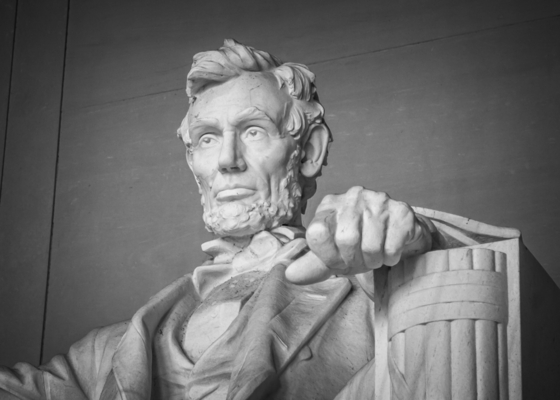Eight score, two months, and 25 days ago, a man who, especially in his younger life, fretted often about being forgotten, humbly admitted, “The world will little note, nor long remember what we say here.” The media mocked him brutally for his “silly remarks.” They brushed them contemptuously aside, “willing that the veil of oblivion shall be dropped over them and that they shall no more be repeated or thought of.”
His speech, in other words, was poorly received on Rotten Tomatoes.
Abraham Lincoln did not often miss the mark in his speeches. But on that day, with that particular remark, he did. But so, too, did his critics.
Try as they may, they could not suppress the then-preisdent’s words from being “repeated or thought of.” The “veil of oblivion” that even Lincoln assumed would shroud his negligible address, The Gettysburg Address, and which his detractors were more than happy to manufacture, never materialized. Lincoln was wrong.
He was wrong, precisely because he was right. In a mere two minutes and 272 words, Lincoln touched on something eternal, ethereal, and as of yet unrivaled in American speech-making. He proved forever the power of brevity and eloquence.
Today, February 12, would have been Lincoln’s 215th birthday, and we are still talking about his “silly remarks,” analyzing them with a level of admiration that would have surprised the 16th president.
“Four score and seven years ago,” he declared on November 19, 1863, at the dedication of the Gettysburg Civil War Cemetery, “our fathers brought forth on this continent a new nation, conceived in liberty, and dedicated to the proposition that all men are created equal. Now we are engaged in a great civil war, testing whether that nation, or any nation so conceived and so dedicated, can long endure. We are met on a great battlefield of that war. We have come to dedicate a portion of that field as a final resting place for those who here gave their lives that that nation might live. It is altogether fitting and proper that we should do this. But in a larger sense we cannot dedicate, we cannot consecrate, we cannot hallow this ground. The brave men, living and dead, who struggled here have consecrated it, far above our poor power to add or detract. The world will little note, nor long remember, what we say here, but it can never forget what they did here. It is for us the living, rather, to be dedicated here to the unfinished work which they who fought here have thus far so nobly advanced. It is rather for us to be here dedicated to the great task remaining before us, that from these honored dead we take increased devotion to that cause for which they gave the last full measure of devotion, that we here highly resolve that these dead shall not have died in vain, that this nation, under God, shall have a new birth of freedom, and that government of the people, by the people, for the people, shall not perish from the earth.”
That was it — the speech heard ‘round the world, the echoes of which are still reverberating, louder and louder, today.
But what makes it powerful — more than just euphonious — is that Lincoln actually lived it. Whether or not he realized it, he was describing his own life’s work — his own God-given calling, duty, and mission.
Lincoln’s speeches are truly great. They are well worth remembering, studying, passing down to the next generation. But his speeches alone are not what makes him great.
“The world will little note, nor long remember, what we say here,” Lincoln believed. What, then, according to the Great Emancipator, was worth remembering? “What they” — and I would include Lincoln in that number — “did.”
No, Lincoln did not bleed and die on the battlefield. Instead, he dedicated himself to the unfinished work for which patriots in every generation have fought. He surrendered the last full measure of his devotion in service to a cause for which the Pilgrims and Founders and millions of Americans so nobly sacrificed. To his dying breath, he resolved that government of the people, by the people, for the people, would not perish from the earth — not on his watch.
That is Lincoln’s legacy. More than his melodic speeches, what with their heavenly heights of grandiloquence, his legacy, in short, is one of service to his nation and duty to the Union. And for that, the memory of Abraham Lincoln is enshrined forever in the hearts of the people for whom he saved the Union — a people who now look to him as the preeminent example of what it means to serve one’s country.
Notably, many of Abraham Lincoln’s erstwhile critics have since rectified their mistaken views of his Gettysburg Address, coming, at last, to understand, as one Lincoln contemporary said, “the wisdom of his course.” For example, in 2013, the newspaper behind the infamous “silly remarks” critique recanted its woeful misjudgment, noting:
“Seven score and ten years ago, the forefathers of this media institution brought forth to its audience a judgment so flawed, so tainted by hubris, so lacking in the perspective history would bring, that it cannot remain unaddressed in our archives…. In the fullness of time, we have come to a different conclusion. No mere utterance, then or now, could do justice to the soaring heights of language Mr. Lincoln reached that day. By today's words alone, we cannot exalt, we cannot hallow, we cannot venerate this sacred text, for a grateful nation long ago came to view those words with reverence, without guidance from this chagrined member of the mainstream media.”
Happy birthday, Lincoln. Thank you for saving the Union
Published in Blog on February 12, 2024 by Jakob Fay


